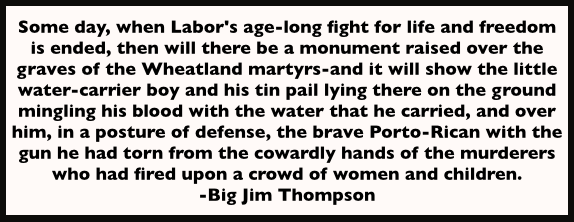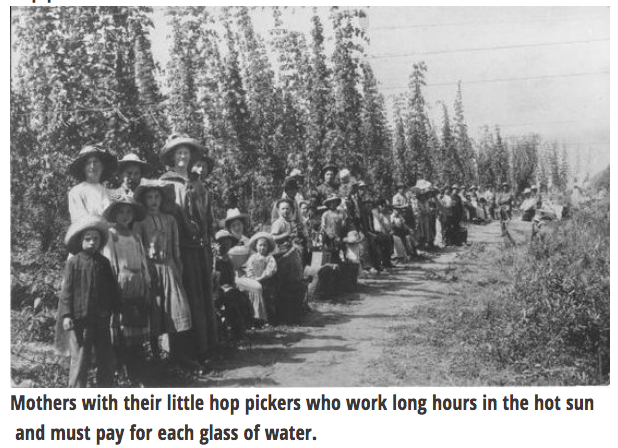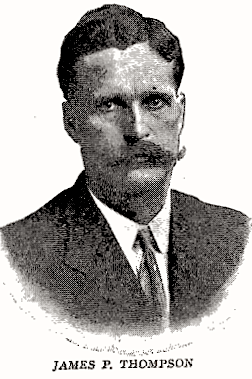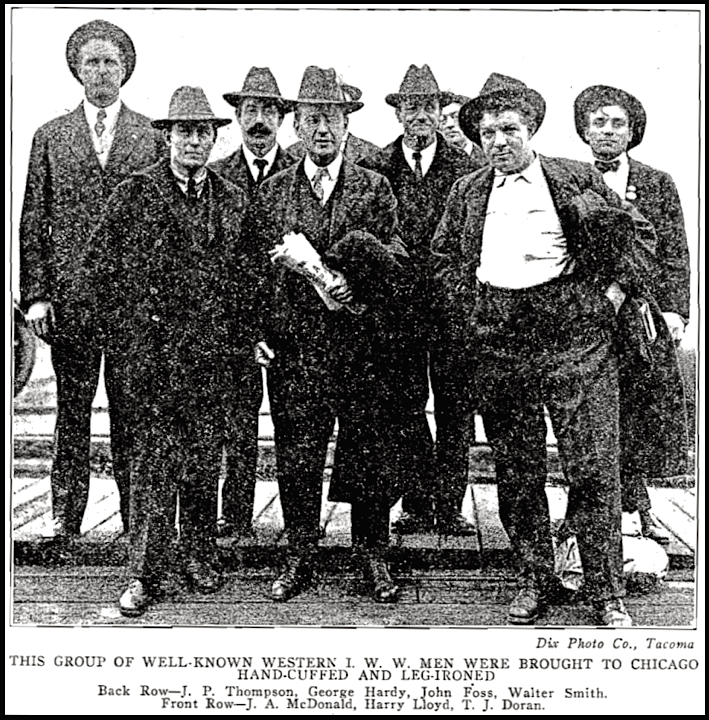
~~~~~~~~~~~~~~~~~~~~~~~~~~~~~~~~~~~~~~~~~~~~
Hellraisers Journal, Saturday June 29, 1918
Chicago, Illinois – Big Jim Thompson for the Defense
James P. Thompson, known to his Fellow Workers as Big Jim Thompson, was the first witness called by the defense in the Chicago I. W. W. Trial. He was on the stand for two days and spoke of his many years as an I. W. W. organizer.
FW Thompson wept as he recalled the Wheatland hop-pickers strike of 1913 and the massacre of the improvised workers there, shot down by sheriff’s deputies for the crime of attempting to organize.

Through his tears, Thompson predicted:
Some day, when Labor’s age-long fight for life and freedom is ended, then will there be a monument raised over the graves of the Wheatland martyrs-and it will show the little water-carrier boy and his tin pail lying there on the ground mingling his blood with the water that he carried, and over him, in a posture of defense, the brave Porto-Rican with the gun he had torn from the cowardly hands of the murderers who had fired upon a crowd of women and children.
From The Tacoma Times of June 26, 1918:
Raymond Man Is I. W. W. Witness
(United Press Leased Wire.)
CHICAGO, June 26.-“Practical sociology” marked the opening of the I. W. W. disloyalty trial here today.
Denied permission to introduce sociological reports to show the I. W. W. was rightfully organized to “fight existing evil conditions,” Attorney Geo. Vanderveer placed J. P. Thompson, Raymond, Wash., on the stand.
Thompson, champion swimmer, longshoreman, lecturer and organizer, began qualifying as an expert investigator of labor troubles by relating his life story. Later he was to be questioned on the plan of the I. W. W. to unseat “the master classes.”
Vanderveer’s opening address claimed loyalty for the organization. I. W. W. members in uniform and others who worked in munitions plants, he said, would be brought in to show they worked loyally and with a minimum of labor trouble after war was declared.
———-
[Photograph added.]
~~~~~~~~~~~~~~~~~~~~~~
SOURCES
The I.W.W. Trial
-Story of the Greatest Trial in Labor’s History
-by one of the Defendants
-by Harrison George
—-with introduction by A. S. Embree.
IWW, 1919
https://catalog.hathitrust.org/Record/100663067
“Defense Opens” – Testimony of James P. Thompson
https://babel.hathitrust.org/cgi/pt?id=umn.31951d01368761a;view=2up;seq=72
The Tacoma Times
(Tacoma, Washington)
-June 26, 1918
https://www.newspapers.com/image/68053559
IMAGES
Hop Pickers, Durst Ranch, Wheatland, California, 1913
https://reuther.wayne.edu/node/4068
James P Thompson, IWW, ISR p366, Feb 1918
https://archive.org/stream/ISR-volume18#page/n188/mode/1up
WWIR, IWW Thompson, Hardy, Foss, W Smith, McDonald, Lloyd, Doran, ISR Jan 1918
https://archive.org/stream/ISR-volume18#page/n171/mode/1up
See also:
IWW Trial by H. George, pages 71-74:
https://babel.hathitrust.org/cgi/pt?id=umn.31951d01368761a;view=2up;seq=72
Big Jim Thompson Takes the Stand
JAMES P. Thompson-“the rough-neck Isaiah” of the American proletariat, took the stand as the first witness for the defense and for two days the marble walls of a federal court echoed with the most passionately terrible denunciation of capitalism ever heard in such dignified surroundings.
Vanderveer’s questions passed swiftly over Thompson’s career as a worker from the time when he became a marine fireman on the Great Lakes at the age of 15 until 1905, when he left the I. L. A. which he helped organize on the Chicago waterfront, to begin his long carer as a lecturer for the I.W. W.
Landis sustained the government’s objection to the introduction of the report of the Industrial Relations Commission, but in Thompson’s denial of making seditious speeches, he was allowed under the rules to show what his speeches really were, and in reproducing them on the stand he read copiously from the report the parts taken as texts for his lectures given to audiences throughout the country.
In this fashion the industrial background of the case leaped into view and Thompson laid the philosophical and economic basis for the I. W. W.’s attack upon the whole capitalist regime. Logical in the facts and figures cited to prove his contention of the class struggle and the unequal distribution of wealth; tragic in his vivid portrayal of the sufferings and brutalities born by the workers and their desperate and bloody struggles on the battle fields of industry.
Thompson broke down and tears coursed down his cheeks as he told of the strike of hop-pickers on the Durst ranch at Wheatland, California, in 1913.
[He said:]
Some day, when Labor’s age-long fight for life and freedom is ended, then will there be a monument raised over the graves of the Wheatland martyrs-and it will show the little water-carrier boy and his tin pail lying there on the ground mingling his blood with the water that he carried, and over him, in a posture of defense, the brave Porto-Rican with the gun he had torn from the cowardly hands of the murderers who had fired upon a crowd of women and children.
Lawrence, Ludlow , Everett-the whole story was told with a gaunt and terrible coloration of how the workers live, labor and die to feed the fortunes of great industrial kings. Scornfully turning to the prosecution he continued:
The very people who are abusing the I. W. W. today, if they had lived in the days of our forefathers would have been licking the boots of King George. They would have said of the boys fighting bare footed in the snow at Valley Forge, “Look at them! They haven’t got a shoe to their feet and they are talking about Liberty!”
The people who are knocking the I. W. W. are the same type who dragged William Lloyd Garrison through the streets of Boston with a halter; who killed Lovejoy and threw his printing press into the Mississippi River; it is the same type who murdered Frank Little!
Nebeker rose to object, to be met with a hot rejoinder,
[Said Thompson:]
I do not mean to be personal. This is what I said in my lectures, but if the shoe fits-wear it.
[Thompson continued:]
The status of women as wage workers is most important; not only as they are used by employers to scab upon the male workers, but because their low wages threaten the very vitals of society with the cancer of prostitution.
Reading from the report of the Illinois Vice Commission, he cited statistics showing that two-thirds to three-fourths of women wage workers receive less than $8.00 a week, nearly one-half get $6.00 per week; while Marshall Field, who employs women and girls at these figures, receives an income from their labor at the rate of $700.00 an hour.
Thompson told of the sordid lives of these girls, who forsake one necessity for another necessity in trying to live a life of normal decency until that hour when virtue seems a light price to pay for just a little relief from the miseries of barren existence-for only an hour in the sunshine to these little “flowers that grow in the shade.”
Citing the vast fortunes supposed to be the reward of men with “mighty brains,” Thompson pilloried an anti-social morality which justifies the use of mental ability in exploiting labor.
[He said:]
If your brain is good you are rich already, but you are a mental prostitute when you use it as an instrument of plunder.
He quoted Supreme Court Justice Brandies as saying that “America has an hereditary aristocracy of wealth which is foreign to American ideals and is menacing to the nation as a democracy.”
[Said Thompson further:]
Justice is denied, the whole machinery of government is in the hands of employers and there is one law for the rich and another for the poor.
[He] quoted from a speech of William H. Taft wherein the ex-President said: “We must keep the Law and Justice a little closer together in order to justify the Law.”
Commenting upon such conditions, Thompson cited the words of warning uttered by Judge Cullen of New York: “There is danger,” said Judge Cullen, “real danger, that the people will see with one sweeping glance how we lawyers in the pay of predatory wealth corrupt law at its fountainhead; that the furies may then break loose and all hell will ride on their wings.”
Thompson then elaborated upon the theory of Industrial Unionism as a method used in purging the social order of the evils of oligarchy and freeing political state from the corruption of absolutism.
[He said:]
As an end, we want Industrial Democracy; the industries should be owned by the people, operated by the people, for the people. Scientifically organized labor is the only logical and efficient force making for social progress; that is why we I. W. W. organize Industrial Unions into One Big Union-that is why we say we are “building the New Society within the shell of the old.”
[Photograph and paragraph breaks added.]
For the cross-examination of FW Thompson by Prosecutor Nebeker, see:
https://babel.hathitrust.org/cgi/pt?id=umn.31951d01368761a;view=2up;seq=76
Note: First ad I can find for this book:
Butte Daily Bulletin -page 3
-Mar 5, 1919
https://www.newspapers.com/image/176048912/
For on Wheatland Hop-pickers of 1913:
“The Wheatland Hop Riot” by Sam Lowry
WE NEVER FORGET-August 3, 1913
Note: this was not a “riot,” but a peaceful assembly of workers, that is, until armed sheriff’s deputies stormed the meeting at the behest of the ranch owner.
https://libcom.org/history/1913-wheatland-hop-riot
Wheatland Hop Riot, Memorial Plaque, Aug 3, 1913
https://libcom.org/files/The%20Wheatland%20hop%20riot.pdf
For JP Thompson’s CIR Testimony, Aug 12, 1914:
Commission on Industrial Relations
-Fifth of Eleven Volumes of Testimony
4097-5086: Volume 5
https://books.google.com/books?id=z-ceAQAAMAAJ
4190: Seattle, Wash., Wednesday, August 12, 1914—10 a. m.
Present: Commissioners Commons (acting chairman), Lennon, Garretson, and O’Connell; also W. O. Thompson, counsel.
https://play.google.com/books/reader?id=z-ceAQAAMAAJ&printsec=frontcover&output=reader&hl=en&pg=GBS.PA4190
4217: Afternoon Session
https://play.google.com/books/reader?id=z-ceAQAAMAAJ&printsec=frontcover&output=reader&hl=en&pg=GBS.PA4217
4233: Testimony of Mr. James P. Thompson
https://play.google.com/books/reader?id=z-ceAQAAMAAJ&printsec=frontcover&output=reader&hl=en&pg=GBS.PA4233
~~~~~~~~~~~~~~~~~~~~~~~~~~~~~~~~~~~~~~~~~~~~
Wheatland Hop “Riot” of 1913
The Red Flag – Socialist Victory Choir


